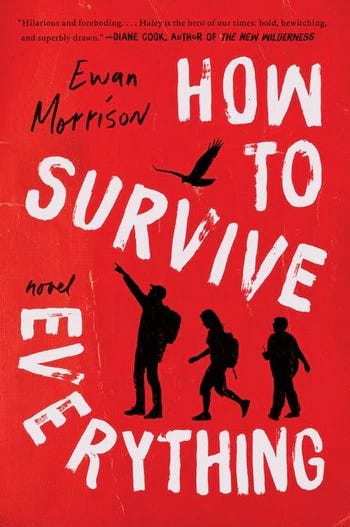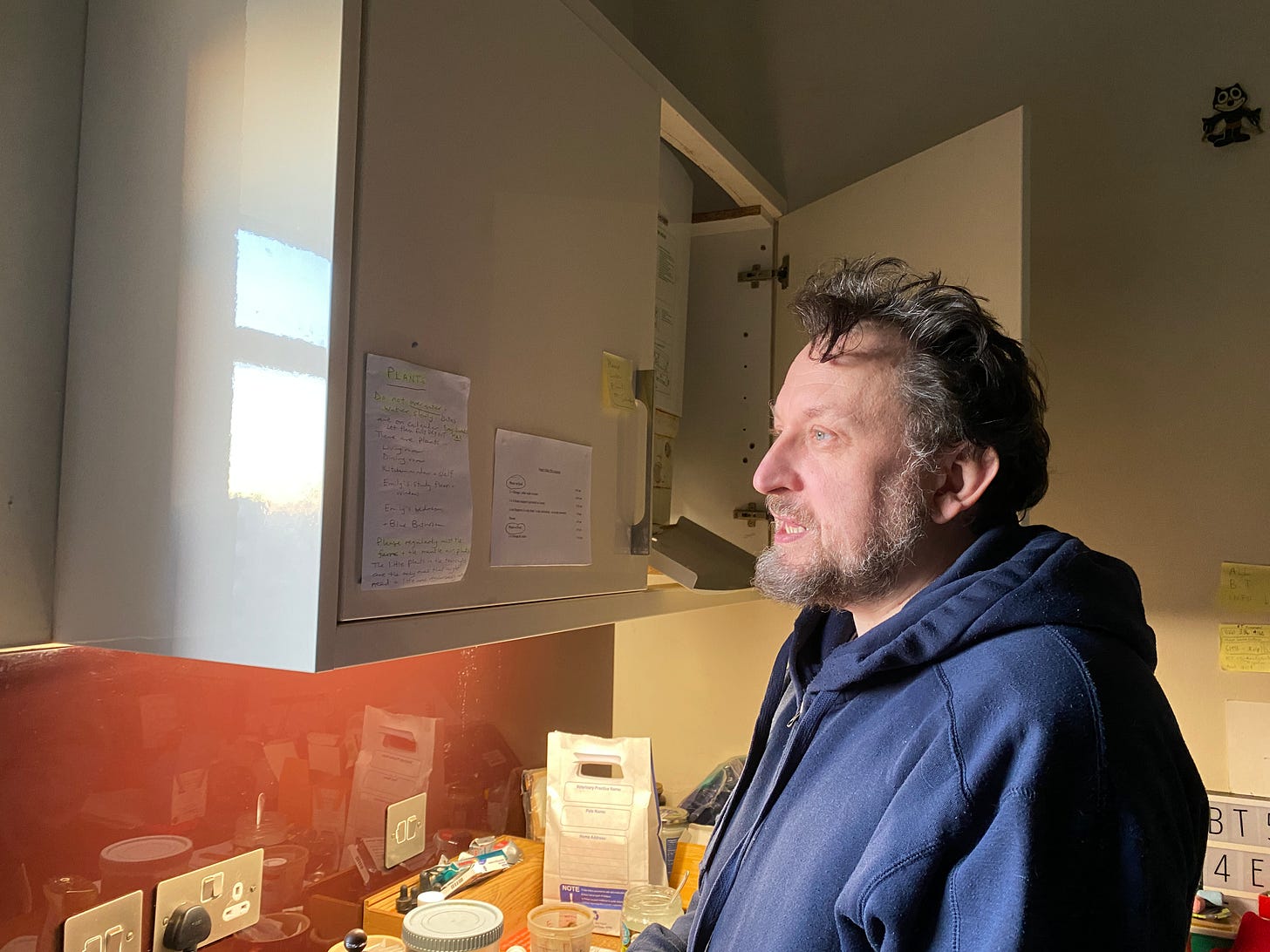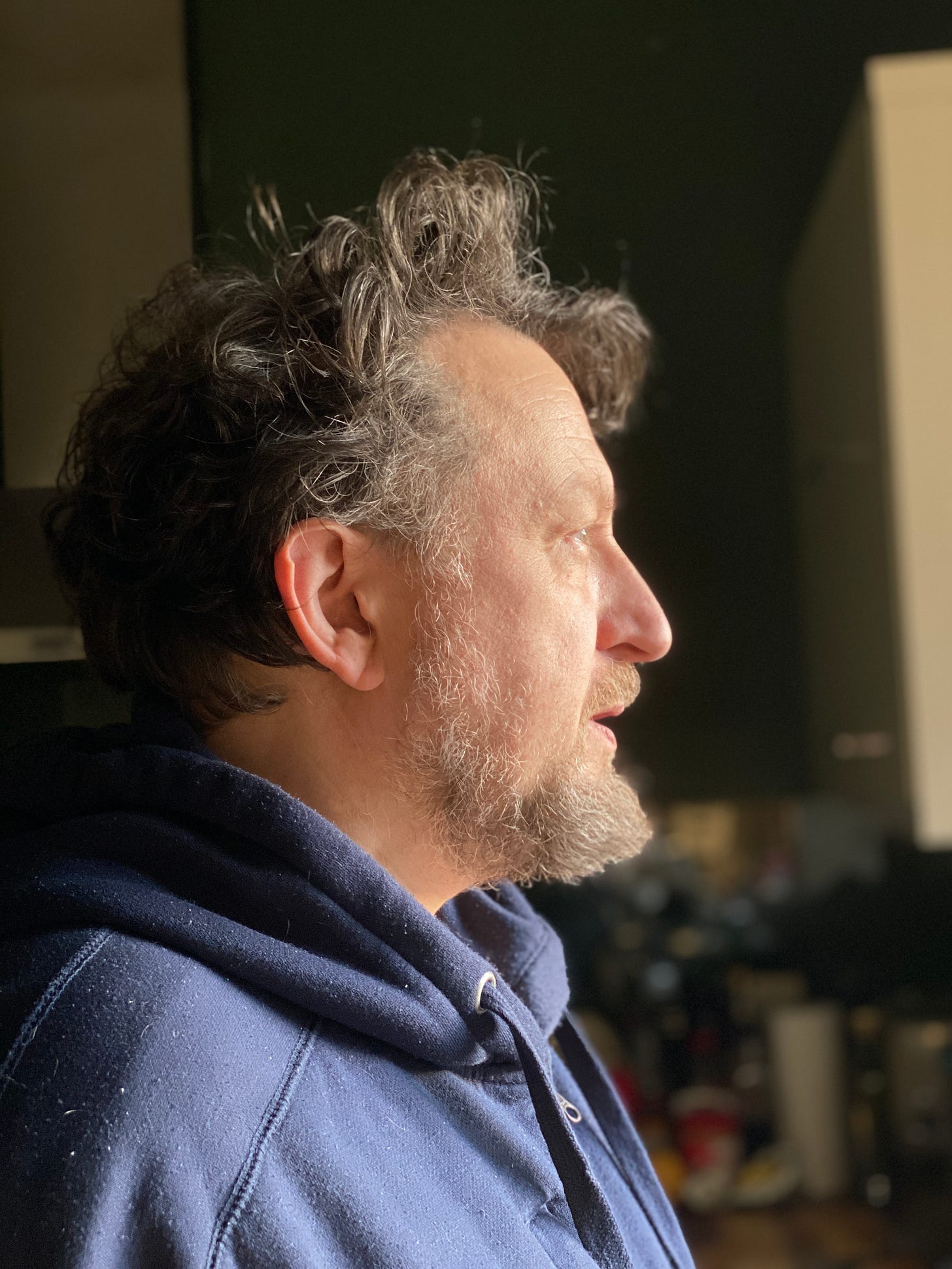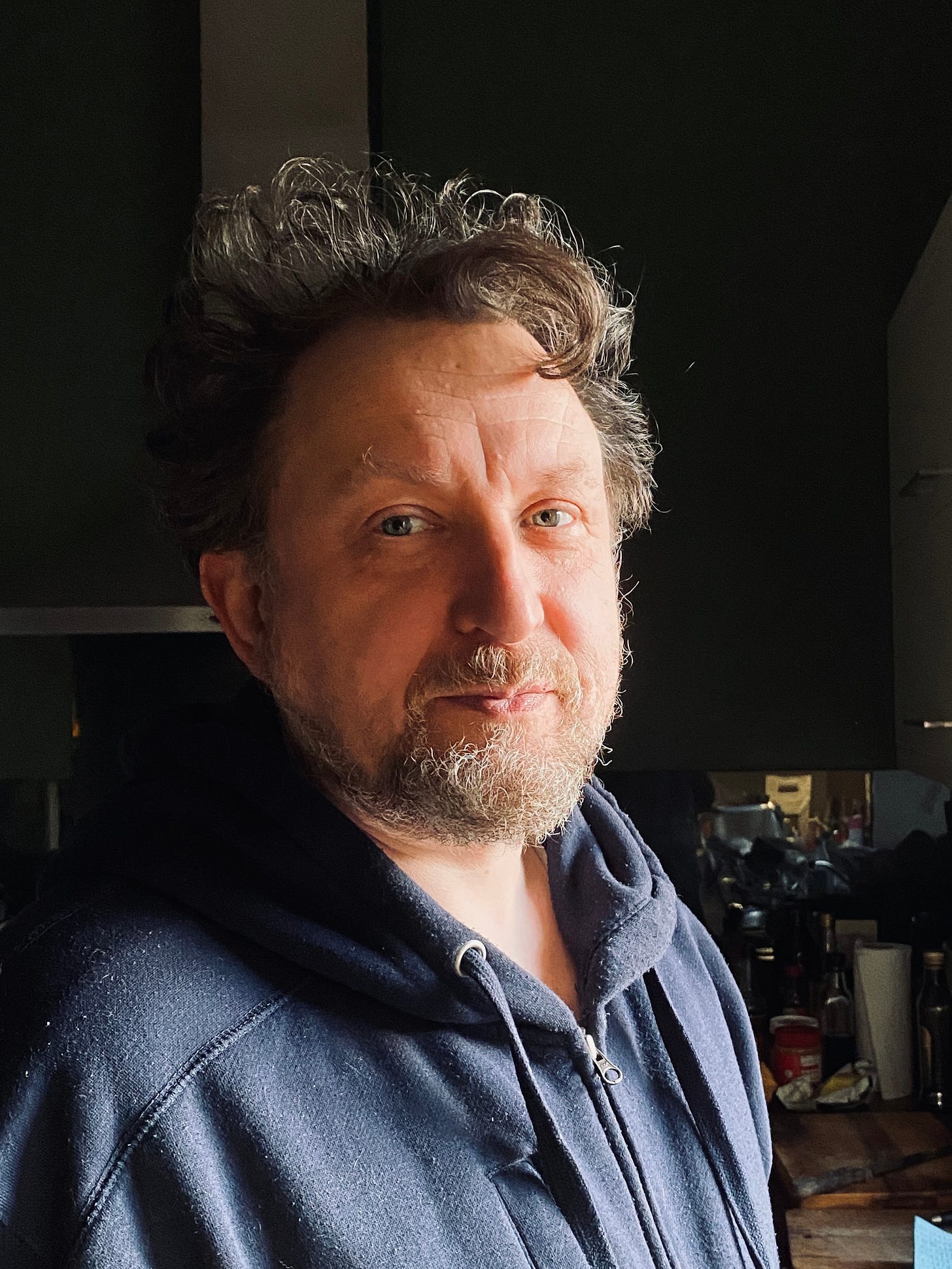The world is big and our filter bubbles are small, so it is easy to miss things. Despite following Ewan Morrison on Twitter and enjoying his very popular cultural history posts, I was somehow unaware that he had published a novel about doomsday preppers in 2021. It was only with its US publication and the subsequent sale of the TV rights to the producer of Gone Girl, that I managed to get my hands on this fantastic post-pandemic thriller.
I was obsessed with TEOTWAWKI a few years ago so the book resonated with me. When I decided to write about the topic, I thought Ewan Morrison would be the perfect person to talk to. Unfortunately, it being winter, we both got ill or depressed and didn’t manage to meet until this week. During this time, Morrison wrote a stimulating critique of the idea of optimistic nihilism and we ended up talking more about this essay than anything else.
Interview Transcript
This transcript was generated by AI then edited by me and may have errors.
It's 15 December 2022. We're coming up to the darkest period of the year. Glasgow is experiencing temperatures as low as minus nine degrees centigrade. Christmas is approaching with a cost of living crisis and energy crisis. There's even a risk of blackouts on the horizon. Fortunately, my dictaphone is battery operated so we should get through this interview.
I'm sitting in the cosy office of Ewan Morrison. Ewan is the author of eight books, including Swung, Tales from the Mall, and Nina X. His most recent novel is How to Survive Everything and is about doomsday preppers.
Ewan also writes journalism and this week published a fascinating article on optimistic nihilists. It's with this that I wanted to begin.
Neil Scott: I want to start at the beginning: the Big Bang, creation. How interested are you in the origin of the universe and what does it matter to our sense of self?
Ewan Morrison: I think that's really important. We tend to, without realizing it, frame our worldviews around narratives about the cosmos. For example in the 1850s, the heat death of the universe was put forward as a thesis and gathered weight until it became the norm around the turn of the century. And if you look through Nietzche and Schopenhauer you find references to the theory of the heat death of the universe and it's from this that the idea of the meaninglessness of existence comes about.
For those who've not come across it before, heat death is the idea that the universe just keeps expanding and expanding and cooling down, and cooling down and cooling down until everything is dead. Everything is zero degrees kelvin with no activity between atoms whatever. Just nothingness.
NS: Total entropy.
EM: A state of total entropy, after everything gets sucked into the black holes and they leak out their energy through Hawking's radiation. The time scales for this are vast. We're looking at a googolplex years until that happens. But it's a theory that lends weight to the philosophical issue of meaninglessness. I think we've been haunted by the idea that life is meaningless since the theory of the heat death of the universe, which coincided with the death of God about the same time in 1850s with Schopenhauer and Nietzsche. Once you dabble with this kind of stuff it opens the floodgates to nihilism of one kind or another.
I'm more inclined to want to believe in the idea of a cyclic cosmology, whether that's Penrose's theories of cyclic cosmology or the Big Bounce as they call it, where the universe expands then contracts again, expands and contract again.
NS: This is where Nietzche got to with the idea of eternal recurrence, right? The idea that, even though we are going to live seemingly meaningless moments, like we're going to live them again and again and again, which makes it important that we do essential things. I'm going to be interviewing you for the rest of eternity ...
EM: ... so I better get it right. Nietzsche wanted a positive outcome to his philosophy, but as his mind was starting to fall apart, the attempts became more fragmented, abstract and desperate. So there's very few people, me included, who who can really get a handle on what he really meant by the eternal return. Is he actually talking about a universe that repeats or is he talking about reincarnation or just a rule that you live your life by, so that you would say, well, I might as well make the best of this moment.
NS: These questions of scale are really important. You could talk about the 14 billion years of the universe to this point. Or you could talk about geological time: the anthropocene making people feel depressed because of the climate crisis. But equally we get the mindfulness movement talking about enjoying a cup of tea. How do you feel about that question of scale? Do we need to care about what happened a billion years ago or a thousand years ago? Where do you exist? What kind of scale?
EM: It's part of a broader question about the meaning crisis that we live with just now. A lot of the behaviors we're involved with just now are forms of nihilism, or optimistic nihilism as it's called, where you just simply distract yourself from the big questions of scale. So you distract yourself from next week, next year, and the downside of that way of living with that small frame is that it makes it hard to set long-term goals or to believe in long-term things: having a family, trying to save up for a house, or trying to work in a single career. Life can be very fragmented when you haven't got a lifelong scale.
With capitalism everything is short term. The digital economy means that we work short-term contracts without any long-term connections to people. The idea of a job for life now seems almost impossible unless you are a billionaire who owns your own company. We have to shift with the technological changes that hit us. You can start off as a film editor and then film gets thrown out, so you have to become a video editor, and then you then have to become a digital editor, and then you have to compete with people who are ten years younger than you who know the computer more than you do. And before you know it, you're running your own business from your laptop, whereas 20 years ago, you worked in a huge institution editing, broadcast television. There's many jobs that are just becoming fragmented. The framing that we live with now is focused on survival in the now.
There's great dangers in looking at the cosmic scale, it can lead to terrible states of hopelessness and depression, but it's good to check in on it every now and again just to make sure that you're not getting caught up in the minutiae of daily survival and consumerism. You have to step into the space that would've been previously occupied by religion.
NS: What's the difference between Gen X nihilism and the optimistic nihilism of today?
EM: The great problem with optimistic nihilism today is it's a demotivator. It's a backdoor out of any situation, whether that's work or career or art. It's the question, why should I do anything? I'll just focus on my own pleasure, even though pleasure itself is meaningless ... even though the self itself is meaningless. It's full of contradictions, optimistic nihilism. Gen X were what I would call stage one nihilism, which is the idea that it's extremely cool to destroy things.
You got this just before the Russian Revolution, there was a movement, a bit like Gen X, of people who actually went around calling themself nihilists. Can you imagine how funny that would've been? "Oh, we're the nihilists. You know, we've come to smash your belief system!"
Gen X nihilism is really just the start of nihilism. Nietzsche would be very disappointed in that kind of nihilism because he would say, "okay, you're against the church and you're against the government, and you're against marriage, and you're against having kids and you're against everything shopping, consumerism, the sexes, but you're still standing on some ground that you believe is solid. You've not gone deep enough to realize that you're actually standing on the void." Gen X spent 10 or 20 years destroying other people's belief systems in a playful punky way and then we realized we were on a very thin veneer over the void.
NS: One of the critiques of nihilism is it's the obverse of the religion that came before it. Atheism is an example where the whole moral framework is built upon the foundation of Christianity. In the same way as a the Labour movement came out of Methodism ...
EM: Sure, the Protestant sects that left and went over to America, the whole progressive movement came from those Protestant sects that were too annoying to us in the UK. We sent them away in little ships, the Pilgrim fathers ...
NS: So is nihilism just a heresy, a form of Christianity, but edgier, darker, like the Manichean heresy?
EM: If you really do it properly, like Nietzche did, you have to throw away morality, you have to, you can't just clinging to a Christian morality and be nihilistic about everything else. That's the challenge for most people who call themselves nihilists, they're still clinging to the idea that they're a good person. If you're a true philosophical nihilist you would have to explore the possibility that there are no morals. What does it matter if you die, if you kill yourself, or if you kill a hundred people. One of the dangers of going all the way with nihilism is you will, once you reject morals as well there's really nothing to stop you destroying yourself and others.
NS: In the article you say you were a nihilist for about 15 years. Did you make it all the way?
EM: No, but I made my way to complete demotivation. It's just that sense of: "why should I finish reading this book? You know? There's no point. There's no point in reading, there's no point in education. I'll get drunk. But what's the point of getting drunk. I'll go and see some friends, but all my friends are going to die too. So what's the point of that? Well, I'll just stay here, but what's the point of staying here? Why am I here?"
I went through periods of deep, deep depression as a result of the nihilism that I got myself, which started off in a punk rock way of just fuck everyone and fuck all values. But it eats away your own values and your own motivation. I still struggle with depression to this day. I've done lots of therapy because of depression. I use writing as a way to keep myself motivated to not sink into depression. The nihilist’s question of "why?" always turns into "why bother?" I've spent 30 years struggling with that.
NS: You never found an answer, you never found the light ...
EM: I've never found like a single cure. But I do have a greater respect now for belief systems that do provide a light because I see that, even though it would require a leap of faith for me to become a Catholic or a Daoist or a Buddhist, I can understand that we are a meaning-seeking species. It makes us healthy when we have something to believe in. There's neurological evidence of that now as well. We become unhealthy mentally when we live for nothing. We become horribly demotivated and depressed. It's important to believe in something.
NS: We were talking earlier about individualism and part of the reason I don't subscribe to individualism is because I see people's genetic and familial backgrounds play out through them. When I was researching for this interview I read that your granddad was a Calvinist. I was wondering how you relate to such things?
EM: I think about this all the time. There's the metaphor of a snooker table where you hit one ball and the energy hits another ball, and then it hits another ball, and it hits another ball. Eventually entropy and stops it, but you'll get like six or seven balls will be hit. It's like that with generations. So the energy that comes from one impact passes onto the next, onto the next. And it can take quite different forms. So for example, my great-grandfather was a big Calvinist preacher in Glasgow. My grandfather was a Church of Scotland minister who renounced his faith after the second world war and became a bum. And potentially, well, he, he got divorced. I found out later he possibly committed suicide. My dad was a hippie, rebelling against Christianity, escaping from the city and going to live in the middle of nowhere and he had all these big positive utopian ideas. Utterly imbued with Christian ethic. He didn't realize that though. This idea of peace and utopia was all just a variation of the Christian heaven. He's one of the balls on the table that gets the impact of the of the other one.
In turn, I rebelled against my father's failed utopianism. It drove me nuts because I could see the hippie dream collapsing all through my childhood, turning into all kinds of drunken ... I'm just going to use the word nihilism again ... but the hippies wouldn't see themselves as nihilistic because they're so optimistic, but, their behaviors, especially towards children were dreadful. There's such a lot of neglect and even abuse that went on within hippie families or hippie collectivities.
NS: There's that line of Oscar Wilde: children begin loving their parents, then they judge them, and maybe they might forgive them. When did you first start to judge your parents?
EM: I've definitely been through all those stages. I started judging them in my early twenties. And I had a bit of a nervous collapse in my mid-thirties where I realized I'd become my father. I remember telling people that “oh my God, I'm as bad as he is: I drink to excess, I'm a fornicator, I'm a lost man, I don't know what I'm doing in my life, I'm suicidal, I'm depressed ... just like my dad was.” I've become him and then, after that, I forgive him.
It's important to think about our lives across the generations. I'm still grappling with the problem my grandfather set off by renouncing his faith. Wouldn't it be great if I picked up a faith so we go full circle?
You're not this isolated thing in space and time that has no connection to the past or the future. Part of the problem of individualism as a belief system is it ties in so nicely now to the state we're in with capitalism. This short termism. I warned people about this a decade ago that capitalism was done with the family. You know, the 1950s family unit: buy a car, buy a washing machine, buy a kitchen. It's like, “Nope.” Capitalism's realized it's saturated and now we have to have divorce and people living apart because we can sell many more things if we encourage people to be so-called individuals.
I was a horribly bullied kid, didn't fit in because my parents were hippies. They went North to a working class community, which didn't like hippies, of course, or hippie children. My sister and I got victimized for years. I had a terrible stammer. I couldn't speak properly, but with the prepper mindset, I took comfort in the idea that at least our family is prepared for the end of the world.
It's extraordinary because my grandmother was obsessed with the end of the world, but the Christian end of the world. I do wonder how much of that ideology from the Calvinist church fed into our family. Even my father was drawn to the idea of nuclear apocalypse because his mother had made him fear the Christian apocalypse. And so then it passed on to me but it was funny because we had three generations in the house and none of them thought there was a problem with me preparing for the end of the world.
My grandmother was fine with that because Jesus was going to arrive. My father was like, yep, capitalisms got to end sooner later and there was me filling under the stairs with cans of beans and peanut butter and batteries for a torch.
NS: She didn't want to use the bucket to go to the toilet though.
EM: Yeah, that's one of those wake up calls: the bucket.
NS: You are a little bit older than me; I remember the nineties as being quite an optimistic time. However I was thinking about some of the artists at the time you graduated from the art school in the early nineties — Damien Hirst, the Chapman Brothers, Jenny Savile, Douglas Gordon — and there is a kind of streak of nihilism going through them. So I wonder what was the nihilism like then?
EM: We moved on from punk nihilism, which was the seventies into symptomatic nihilism in the nineties, which is the second stage. The difference between the punks and grunge, which I was part of — grunge and industrial music — was that punks had one horrible death, Sid Vicious, whereas we we had many horrible deaths including Kurt Cobain, Alexander McQueen, Philip Seymour Hoffman, Chester Bennington. All these brutal suicides with massive addiction problems.
Look at Kurt Cobain, that last album In Utero, nhilism has sucked him in completely and yet we bought it, we consumed it. We thought it was cool. The secondary stage of nihilism is when you're not just proclaiming it's great to tear things down. It starts to eat away at your own being and your own reasons to do things. This cool hip nihilism, this negativity towards everything, could be very dangerous. Some of us escaped the orbit of that and some didn't.
NS: Whereas, when I was growing up, it was all Britpop music. We did listen to Nirvana, but there was a line in the sand.
EM: Yeah, Wonderwall instead of Rape Me.
NS: I wonder how all these things connect. Tthere's a good essay by Galen Strawson called Against Narrativity where he says it's perverse to lump together all these random events and say, oh, there's a narrative. We should embrace the fact that they are random. But as a novelist, you can't help but turn things into a narrative ...
EM: Yeah, I come across that opinion a lot. It's like a post-existentialist position that the guy's talking about there: nothing in life adds up, it's all just random. I go back to people like Zygmunt Bauman. He was one of the first to talk about the danger of the collapsing life narrative. And, as a Marxist or a post Marxist, he would talk about how the collapse of the life narrative fuels the next stage of capitalism: you will own nothing, you will not have a full-time job. Everything will be rented to you. Permanence will start to be eaten away as we enter the fourth industrial revolution. I'm very wary of that. I'm scared of where we're headed — with that breakdown of long-term structures. When was the last time you had something that lasted for life? A table or a car or a house or a partner .... there were generations upon generations upon generations of people who even took their name from the thing they did. Like Smith — a family of of Smiths who worked making horseshoes.
NS: I always thought it was the generation just before the hippies who were the last ones to have the sense that you're just stuck with who you are. Beyond that, you can reinvent yourself. If you ever read the letters of Philip Larkin you can see he's just enduring himself. I think that's kind of what institutions are there for, they're things you're stuck with … and that's not always a bad thing.
EM: No, it's not. In fact, there's a quote from Chesterton that traditions are the answers to the questions we forgot. There are a whole bunch of solutions tied into traditions. So when you smash the traditions up it's fun and it's punk. Now it's just spreading everywhere and it's like we're going to put on a veneer that it's fine and it's fun, but all the social structures are fragmenting. We're becoming more atomized. We're now at a stage where nihilism is fun, this is stage three. It's ignoring the horrors of stage two.
NS: I'm interested in how you've managed to keep on top of like the latest developments. Your most recent novel, How to Survive Everything is narrated by a 15 year old girl. How was that?
EM: I try to work as intuitively as possible. It's only since writing the book that I've realized that Gen Z have actually got a real problem. So they've got a problem of aimlessness. I've done research after I wrote the book about the depression and hopelessness that Gen Z are experiencing.
I see with my daughter and her friends. They're lost. My daughter gave an example of a friend of hers who got this random anime tatto on her arm, and my daughter said, why did you do that? And the girl said, I don't know. And she said, well, what does it stand for? What does it mean? She says, oh, she's something I found online. And there's this sense of just that with Gen Z, the collapse of meaning is the real core. It's being caught between life narratives, not knowing where you stand., it's that when you don't know what to believe in and you dunno who you are or what you're doing, what do you do? Well, you spend a lot of time on your phone, and you just distract yourself with tons of stuff TikTok and Facebook. You search little videos about how to survive everything or what the meaning of life is. You build up little theories and you share them with your friends ... but it is just dancing around the edge of the void.
NS: When we talked nine years ago you were deep in a project about utopia and utopianism. I was wondering how the desire for utopia connects with the desire for the end of the world and whether you think of them in the same category?
EM: I do. What tends to happen is that I have an impulse and then I'll explore it. Sometimes, after I've written a book, I'll just keep going with the research. So I've uncovered that utopia and apocalypse come from the same Judeo-Christian route.If you trace it back through history and you go back to the Christian sources: the new Jerusalem, the thousand year reign of Christ will emerge after the apocalypse. That's the basic Christian narrative.
In the 15th century utopianism starts breaking away from the apocalyptic narrative and it says, “look, we don't have to have the apocalypse before we can have paradise. We'll just build paradise.” It's known as the Pelagian heresy, the idea that there's no flaw in humans, so we're perfectible. It gets reborn generation after generation. Communism can be traced right the way back to Christianity. You get this idea that the new perfect society of equals will come into existence after the apocalyptic revolution. So it's basically the same Christian narrative: we'll destroy everything and then we'll have a perfect society.
NS: There is Pascal's wager when it comes to heaven, which says that you might as well, pray because you don't really lose anything by praying and heaven could turn out to be true. I wonder if the same is true with prepping for the end of the world. What is your plan if it all kicks off? Have you got a compound ready, although you probably don't wanna say this on air ...
EM: I'd probably just go down with the ship. One of the problems with being a prepper is that after you've learned how to farm your own fish, how to have a self-sustaining eco garden and all the rest of it, the more you do all that amazing self-sustaining stuff, the more the final chapter has to be about weapons because you'll have the unprepped around you. When the flood comes, whatever the starving, unprepared neighbors will come and demand, invad and attack. The heroic prepper story is always about how to protect yourself against the marauding hoards.
NS: You need to get into archery so you don't run out of manufactured bullets.
EM: Yeah, you need a a good crossbow. Slingshots are also very popular with preppers.
NS: One of the reasons I admire you as a writer, as a person, and as a thinker is because you do think for yourself. You're not totally trapped within this friend/enemy distinction.
EM: 'Ewan no-friends' someone called me.
NS: The world is so tribal and I like the idea of collecting a group of outcasts.
EM: Yeah, I think that's a really good idea. We do tend to cluster. I have outcast friends all over the world now.
NS: But after all these critiques of optimistic nihilists, utopians, and preppers, I was wondering what do you believe in now?
EM: What do I believe in now? Oh God. You really ask the hard questions. Well, I'd love to say there's a single belief system that I believe in. But no, there's not a single belief system that I believe in.
I'm working my way towards a belief system through working out what doesn't work and why things don't work. For a long time I called myself a post-Marxist, then I called myself an anti-utopian. I know that when people have like panacea solutions, total solutions for everything, that's just something that humans do, and they do it wrong every single time.
So I'm not an idealist. I don't believe that there are fixes for the human being. That would put me in the pessimistic tradition: the belief that human beings are flawed. I mean if you look neurologically at the way people are put together, the physiobiology, you realise you can't get rid of hate because hate is a defense mechanism against predators.
Love may seem like a wonderful thing and you can talk about universal love, but at the same time, love physically is about reproduction and is selective. For all the people you love, there are other people you don't love. For every good thing in people, there's a natural negative as well. So I'm against the enforcing of false positivity and positivity projects.
Like a Christian or a Buddhist, I would say humans are broken and humans are bad, and let's start there. Let's say that we're never going to get rid of suffering, but we have to deal with ways that we can make sense of the suffering that we experience.
NS: Nassim Taleb talks about things being Lindy. The idea that if something has been around a long time then it's probably going to stick around a long time. There's the Manioc plant in the Americas that if you don't cook it a certain way then you'll slowly die of cyanide poisoning. It has to be cooked the traditional way. This is institutional knowledge that evolved over hundreds of years, but no one could rationally tell you that's the reason why we cook it like this. I wonder how much of our wisdom, like the Bible, exists just because it works. It has value across time because it helped form long lasting communities.
EM: The golden rule — do unto others as you do unto yourself — is within all of religions. Interestingly, it's not in political philosophy. There are biological reasons for it. There's innate reasons why the species that is collective, it's just part of our evolution. Psychologically we need to treat each other like we want to be treated. There's scientific evidence now to prove that basic religious tenets are true.
NS: Thank you very much for this conversation, Ewan. It's been very stimulating for me and I hope it's been enjoyable for you and everyone listening.
EM: Oh, it's been fantastic. Thank you, Neil.
If you enjoy the interview above, you may also like this interview I did with Ewan for New Escapologist magazine, back in 2014:















